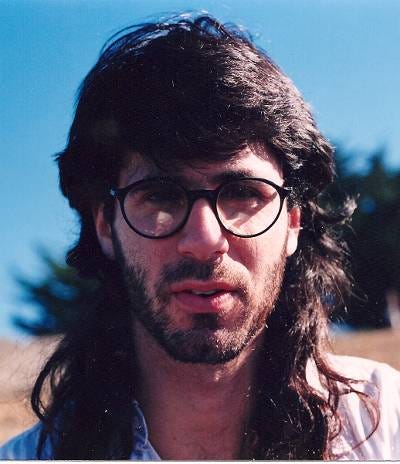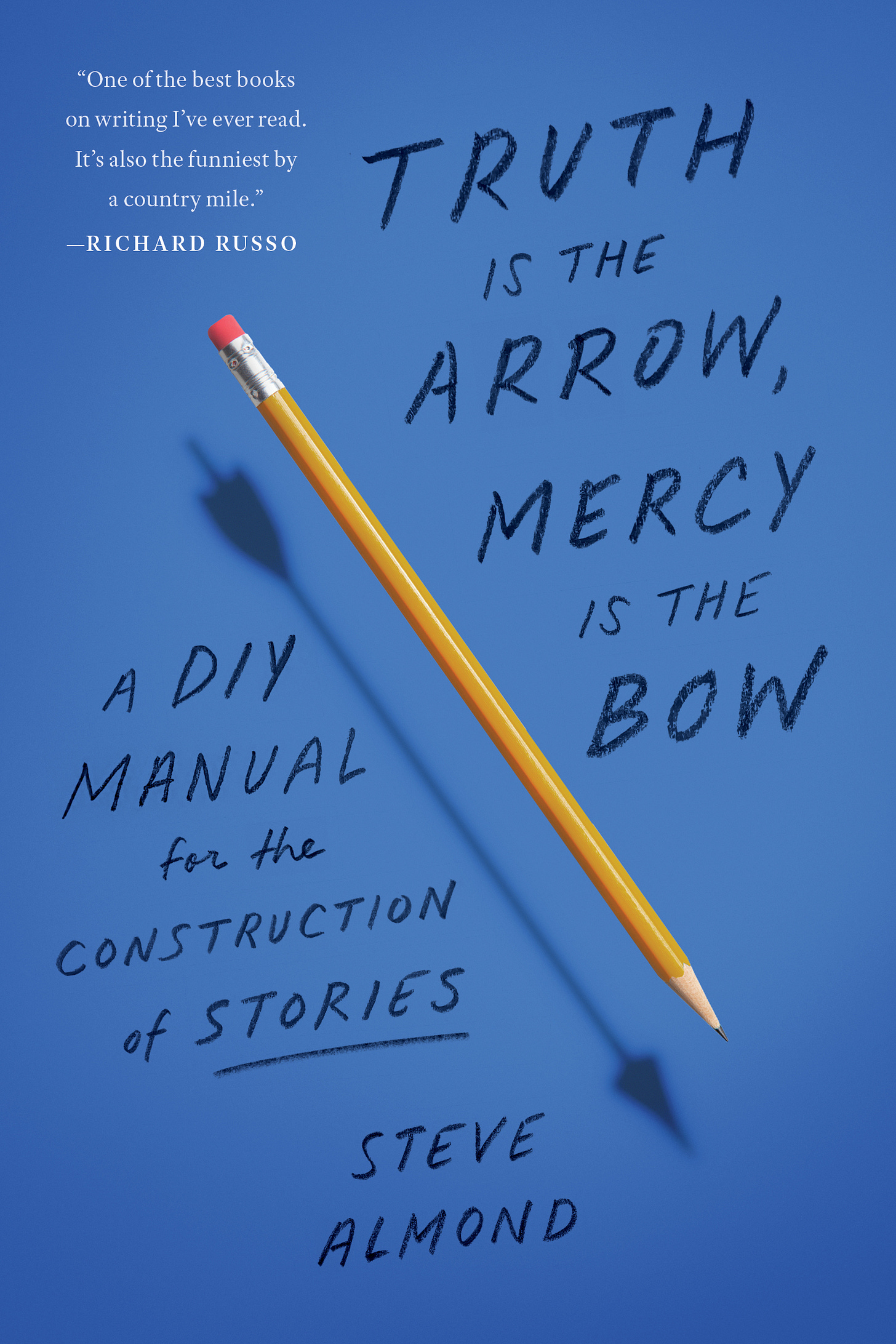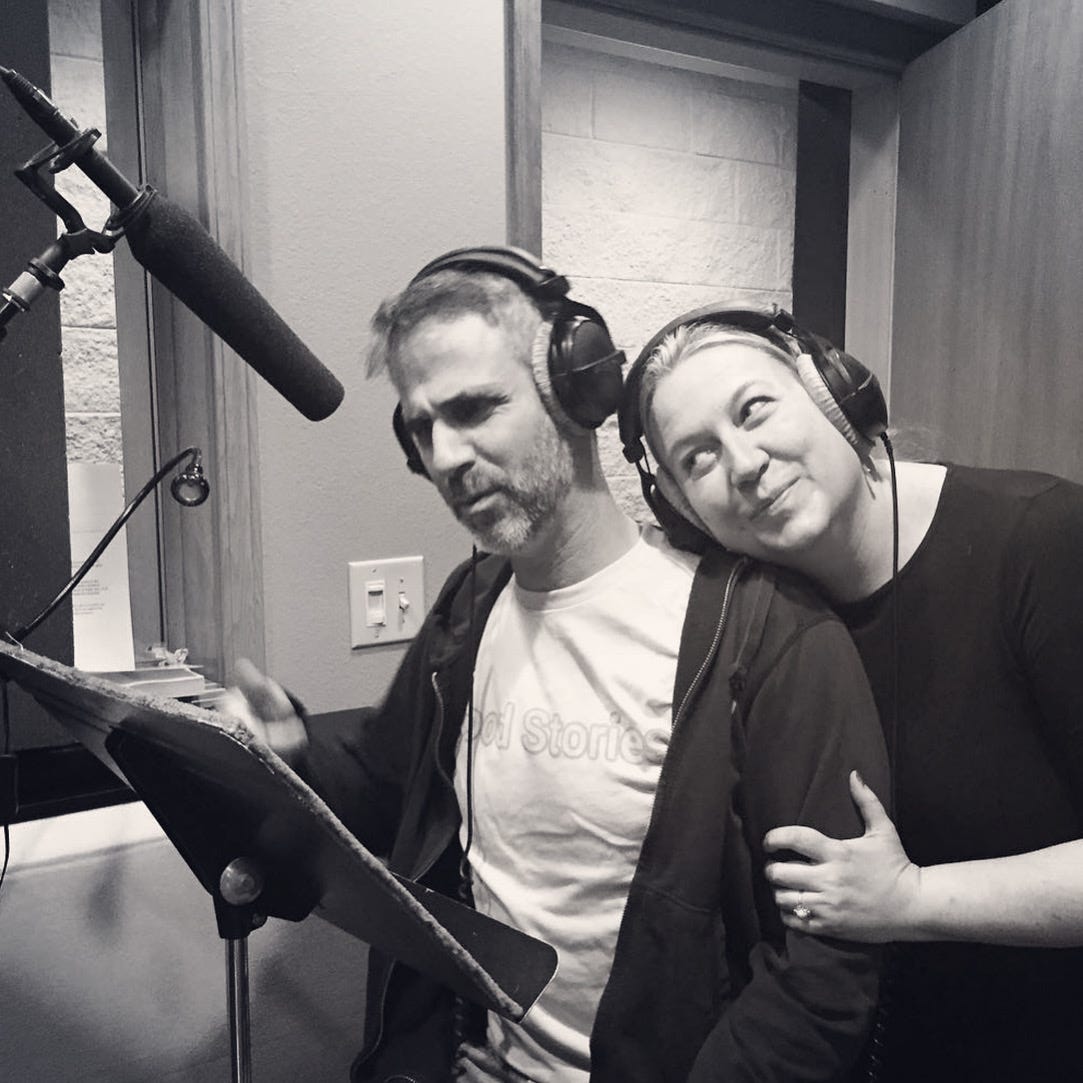Hello friends!
I’m pleased to share another installment of the occasional series I do, in which I invite an author to tell us five things—not only about their most recent book, but about their life too.
Those of you who’ve listened to the Dear Sugars podcast know that the wonderful writer Steve Almond is not only a dear friend of mine, he was also the originator of the Dear Sugar column back when it was published on The Rumpus. I’ve been a fan of Steve’s perceptive, funny, compassionate, beautiful writing since well before I knew him and my admiration for his work has only grown over the years. He makes every paragraph a pleasure to read. He goes right to the heart of things and he does it with tremendous empathy, intelligence, honesty, and humor.
Steve also happens to be a fantastic teacher—as his thousands of students can attest. His new book, Truth Is the Arrow, Mercy Is the Bow: A DIY Manual for the Construction of Stories, is drawn from his decades of experience as a writer and a teacher of creative writing. It’s full of wisdom and truth about the heart, stamina, humility and courage it takes to write well. Of course the writers and aspiring writers among you will love it, but it’s also a book for anyone who is interested in the creative process and curious about telling stories in any form.
I’m so pleased to share Steve’s insightful interview with you here. Steve will be doing several events and leading workshops in various cities over the coming months (Seattle tonight! Portland later this week!) and he’s also doing many events online. You can check them all out here.
Happy pub date, Steve!
xCheryl
Tell us about a time when you took advice that turned out to be really good or really bad.
Long ago, a girlfriend of mine suggested that it would be a good idea for me to grow my hair out. As the accompanying photo will attest, this was not a good piece of advice, at least in the late Eighties, when all this was happening. The result was a hairstyle I would call “The Sensitive Mullet.” Behold your hirsute narrator:

On the other hand, I’m thinking about the time my dad told me I should get back into therapy. I was 35, still full of petulant complaint, fizzing away in a bacterial apartment north of Boston. I hated him for suggesting such a thing and told him so. That’s often how you know a piece of advice is useful: the inconsolable urge to tell the advice-giver to fuck off. Dad wrote me a note saying, “I’m not trying to hurt your feelings, sonny boy. I can see that you’re struggling.”
It’s probably worth mentioning here that my dad is a psychoanalyst.
So I got my ass back into therapy. It was a slow, humiliating, expensive process, as the acquisition of self-awareness tends to be. All these heartbroken fascist wannabes are running around, yelling about how being “woke” is like some form of chemical castration. All it means is that you are becoming less of an asshole. That’s what therapy did for me. I woke up to the various ways in which I was being inconsiderate to other people—and to myself.
It wasn’t because of therapy that I got married and had three kids and wrote a bunch of books and taught a ton of classes. But therapy helped me make those decisions, and has helped me do these things with greater compassion and less anxiety. The goal of therapy—maybe the goal of life—is to esteem who you are and what you’re doing.
Tell us about a personal transformation in your life or a change that you’ve made for the better.
A couple of years ago, I was taking a walk with my teenage daughter. It was winter. Beside us, the Mystic River was sheathed in a plain of gray ice. I don’t remember what we were discussing, only that, at some point, she turned to me and said, “Dad, you’re like this guy who’s always walking on thin ice. But underneath that ice is a lake of rage.”
It was the single most devastating, and precise, assessment of my personality ever rendered. I wanted to drop to my knees—in awe and gratitude. And I’ve spent every day since thinking about what I can do to drain that lake of rage, which can be properly understood as a lake of poison.
Mostly, that’s consisted of me trying to shift from reaction to reflection. That is: to recognize when I feel the lake start bubbling and to ask myself: What’s going on here? Why am I being triggered? What pain or doubt or fear am I concealing?
I’m not suggesting that I’m walking around in some state of grace. Far from it. But I am in the process of trying to identify when and why I feel wronged. There are moments when I need to speak up (to stop walking on thin ice). But there are far more moments when my contempt is simply a way of hiding my vulnerabilities behind grievance.
Tell us about your new book, Truth Is the Arrow, Mercy Is the Bow.
Like you, Cheryl, I’ve been teaching creative writing for many years. And teaching writing is a weird thing, because it’s not just about helping students master a subject. It’s really about helping them discover what stories they’re meant to tell, how best to tell those stories, and how to overcome the inhibitions that inevitably arise when we seize the mantle of narration.
In other words, I didn’t want to write a craft book. I wanted to write a book about the entire creative process. What inspires us to write, the common mistakes we make, and the evil voices that try to shut us down. That’s the part of the book I found most exciting to explore, the scary stuff we don’t often talk about in workshops: writer’s block, ego need, envy, the anxiety we feel around exposure.
As I wrote, I thought a lot about the letters we received when we were doing the Dear Sugars podcast. They were composed, for the most part, by ordinary people. And yet they were almost all gorgeous. Why? Because our correspondents were being so honest about their pain and confusion. The luminous prose was the residue left behind by their dogged pursuit of truth. The more I thought about those letters, the more convinced I became that every human being is a storyteller, that stories are how we seek to understand the meaning of our lives.
I also found, as I tromped through various drafts, that the voice of the teacher, dispensing wisdom from on high, was all wrong. Because whatever insights I’ve gained from teaching are completely useless to me the moment I sit down at the keyboard. Instead, I wanted the book to offer my perspective as a writer, someone who has struggled, and often failed, for whom success isn’t about making the bestseller list but simply outlasting my own doubt. That’s another thing that I learned from you, Cheryl, in your role as Dear Sugar: people don’t need advice so much as they need a companion, someone who will listen to them, and share stories that make them feel less alone.
Tell us about a regret you have or a mistake you’ve made.
Ok, this one is pretty fresh: I failed to thank my wife, the novelist Erin Almond, in the acknowledgments for Truth Is the Arrow. For those who don’t know, the acknowledgments is that little section in the back of the book where the author thanks everyone who helped along the way. My acknowledgments listed all the folks who have hired me to teach over the years, and the various writers who taught me. I concluded with this:
To Erin, Josephine, Jude, and Irvo: I love you. I am working to learn more about what that means. Thanks for being there each day to teach me.
My point was that I’m not always great at loving my wife and kids but am trying—with their help—to get better.
That’s all fine and well. But it ignores the fact that Erin isn’t just my wife. She’s also my creative partner. She’s played an integral role in the development of my ideas about writing. The struggle to write is what brought us together more than two decades ago, and it’s central to our bond. We talk about our work, and the books we’re reading, nearly every day. She’s a magnificent writer and the most talented manuscript editor I’ve ever encountered. I’m lucky to have her as a reader, and lucky, too, that she trusts me to read her work. I should have thanked her for all that, and acknowledged something more: that I never would have been able to teach so many students, in so many far-flung classrooms, without her support.
I’m happy to report that my publisher has agreed to revise the acknowledgments section of Truth Is the Arrow so that it now ends like this:
Last (and first) of all, to my brilliant wife, the novelist Erin Almond, without whom this book would not exist.
That’s not as complete an accounting as she deserves, but it’s a start.
Tell us your best advice.
For a long time, I had a set answer to this question, the one I cited above, and that you, Cheryl, heard many times over the years we recorded Dear Sugars: Our job in life is to esteem who we are and what we’re doing. I don’t mean by this that we should just give ourselves a big hug and pretend that solves all our problems. But I do think that people tend to be too hard on themselves, and that this self-loathing inevitably gets inflicted on the folks around us.
I see this as a writing teacher, too. It’s the reason my new book has such an awkwardly aphoristic title. Over and over, I find myself encountering students who are, in one way or another, blocked when it comes to telling the truth—about their own experiences, and that of their fictional characters. The reason they’re blocked is because they felt guilty about breaking a long-held silence, fearful of the reaction they might receive, ambivalent about all the emotional disruption that comes with writing into deep truth. I tell them that the only path forward is through mercy. If they write with the intention of understanding, and forgiving, everyone involved, they’re going to travel further into the truth.
So I stand by that advice, especially for writers.
But recently, because of some intense stuff going on within my family, I’ve been thinking about how important it is to be able to take the perspective of other people. That can be a real challenge for writers, because our work often depends on being able to offer the reader our voice, our perspective, our radically subjective version of the story.
What I’m realizing, as a partner and a parent, is that my version of the story—insightful and compassionate as it might be—doesn’t really help when my people are struggling. They’re not looking for my solution to the problem. They want to feel seen and understood. The only way for that to happen is for me to think about the situation from their perspective. To do in life what I try to do on the page.
This is especially important for someone like me, because I’m always trying to fix things. I get worried about the people I love and that worry gets in the way of my love. I get impatient to make things all better. But what we call love is really the act of patient attention, of caring enough to imagine how someone else sees the world: what they yearn for, what frightens them, what causes them pain or confusion. My job isn’t to be the hero with just the right medicine. It’s to stay in the room and listen without trying to fix anything.
Steve Almond is the author of Truth is the Arrow, Mercy is the Bow: A DIY Manual for the Construction of Stories and eleven other books of fiction and nonfiction, including the New York Times bestsellers Candyfreak and Against Football. His recent books include the novel All the Secrets of the World, which has been optioned for television by 20th Century Fox, and William Stoner and the Battle for the Inner Life. Steve hosted the hit New York Times Dear Sugars podcast with his pal favorite Virgo, Cheryl Strayed. He is the recipient of a 2022 NEA grant in fiction, and his short stories have been anthologized in the Best American Short Stories, The Pushcart Prize, Best American Erotica, and Best American Mysteries series. He also publishes crazy, DIY books.








Oh my god, this is brilliant. Every paragraph fizzes with vulnerability and authenticity, whilst being expertly crafted. There isn't a sentence here that isn't wonderful. I will be rushing out to buy Steve's book. Thank you for sharing, Cheryl. Right, maybe need to get back to therapy! :-)
LOVE this, what a delightful read - I have just pre-ordered Steve's book, sounds so up my street. I first listened to you and Steve on the Dear Sugar pod in 2014 on WBUR when I was going through a hard time. 10 years of magic! I love you both! xoxo